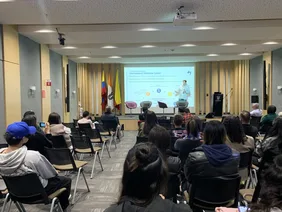In particular, the IWC aims to show how inspiring and instructive it is to study and conduct research at the THI, while at the same time creating a platform for future cooperation for mutual benefit. As part of their workshop at the Universidad El Bosque in Bogotá, Professor Werner Huber and Anna-Lisa Klages held two parallel practical workshops. The Colombian professors were involved in advance and the students were given tasks to prepare.
The Colombian student group supervised by Professor Huber used five traffic junctions near the University of El Bosque, which have a high-risk potential, particularly for vulnerable road users, as real-life laboratories. This group consists mainly of pedestrians, cyclists, and motorcyclists and is very relevant for Colombia: A total of 9,000 road users die there every year, around three times as many as in Germany, and the risk of being killed in road traffic is even four and a half times higher about the population. Students from various disciplines such as mechanical engineering, architecture, and behavioral psychology contributed their perspectives on the interplay between vehicle safety technologies, intelligent infrastructure, and human factors, identified the most common causes of accidents, and discussed possible solutions.
Together with Anna-Lisa Klages, the students mirrored the BMBF's BigTrans project and worked out where they could recognize potential, opportunities and future needs in the energy sector in Colombia. To this end, the students gathered information in advance, including on local, national, and international stakeholder groups. Political structures, historical factors, socio-cultural aspects, and, on the technical side, e-mobility scenarios and the electrification of industry were also taken into account.


![[Translate to English:] Logo Akkreditierungsrat: Systemakkreditiert](/fileadmin/_processed_/2/8/csm_AR-Siegel_Systemakkreditierung_bc4ea3377d.webp)








![[Translate to English:] Logo IHK Ausbildungsbetrieb 2023](/fileadmin/_processed_/6/0/csm_IHK_Ausbildungsbetrieb_digital_2023_6850f47537.webp)


